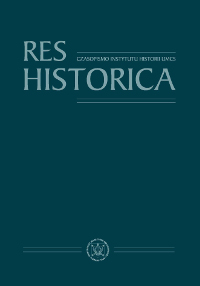Laicyzowanie szkolnictwa a stan religijnej świadomości nauczycieli w województwie lubelskim na początku lat sześćdziesiątych XX wieku
Secularization of the Educational System Versus Religious Consciousness of Teachers From the Lublin Voivodeship in the Early 1960s
Author(s): Janusz WronaSubject(s): History
Published by: Wydawnictwo Naukowe Uniwersytetu Marii Curie-Sklodowskiej
Keywords: teachers; communist party; communist ideology; Catholic church; secular school; secularization; religiosity; social attitudes
Summary/Abstract: The turn of the 1950s and 1960s brought a wide-ranging ideological counter-off ensive in education in Poland. Its aim was to restore control of the communist party over the education of children and adolescents. In the years 1958–1961, the process began, which educational historians call the second battle for the ideological face of the Polish school. In the sphere of broadly understood culture, it aimed at eliminating religion from public life. Laicization was a kind of panacea for the party for all ideological problems. In the propaganda of the communist party, it meant progress, freedom and modern thinking. Religious doctrines and institutions were to be deprived of any influence on education, social life, and political and economic activity. Only the secular principles and goals of socialist education mattered. In the intention of the PZPR, teachers were to become the basic tool of indoctrination of the young generation. Their task was to shape the so-called scientific view of the world, assimilation of the principles of the so-called secular morality, shaping the so-called popular patriotism and internationalism. Institutions of the communist party in education were to supervise it. They were responsible for increasing the politicization of teachers and covering them with ideological training. In 1962, teachers with PZPR party ID cards in the Lubelskie Voivodeship constituted a group of 28.3% of the total number of people working in this profession (12,175 people). The secular school program required a diagnosis of the worldview condition of teachers. In 1962, in the Lubelskie Voivodeship, the District Board of the Polish Teachers Union, at the request of the communist party, conducted a questionnaire to show the attitudes of over 11,000 teachers in the region to religion and religious practices. The survey divided teachers into three groups: atheists, non-practicing believers, and believers and practitioners. Its results showed that the vast majority of teachers are religious and they are not prepared to carry out educational tasks assigned to them by the state authorities in their everyday school work. The worldview revolution desired by the party did not take place. Many teachers were religiously committed. They adopted an adaptive attitude to survive and function in the reality of the People’s Republic of Poland. They were characterized by a social repulsion in the face of officially imposed values and patterns.
Journal: Res Historica
- Issue Year: 2022
- Issue No: 54
- Page Range: 533-548
- Page Count: 16
- Language: Polish

